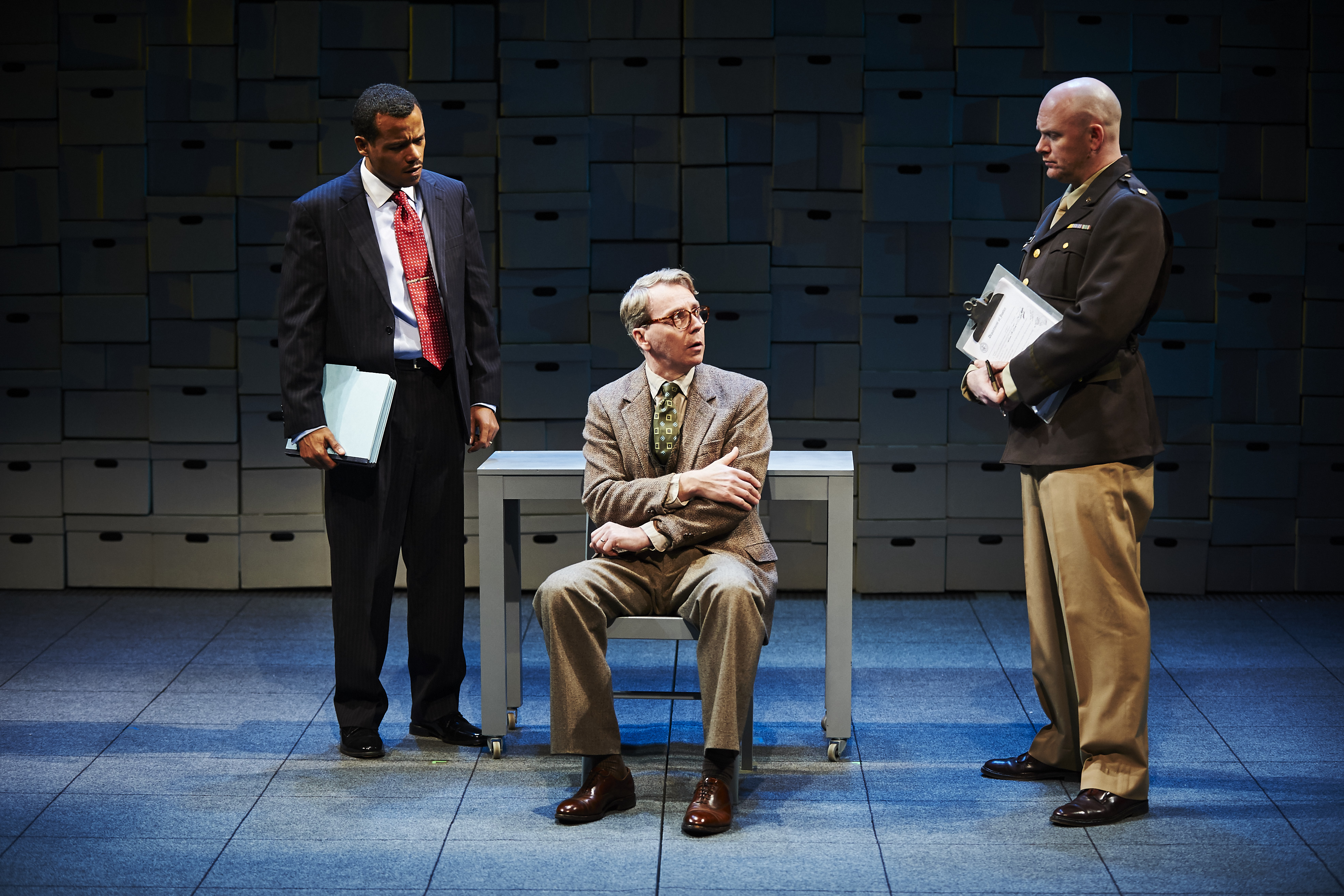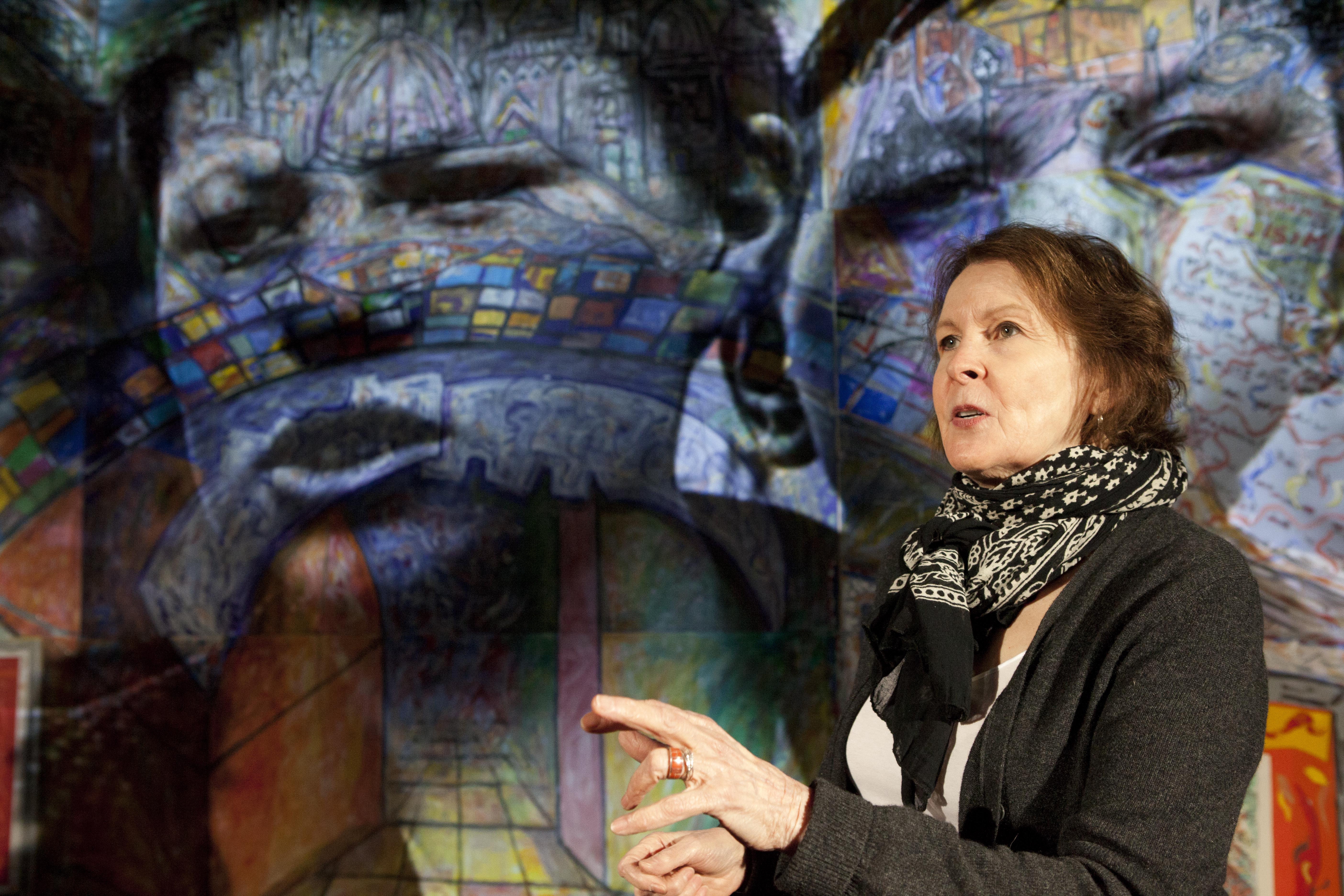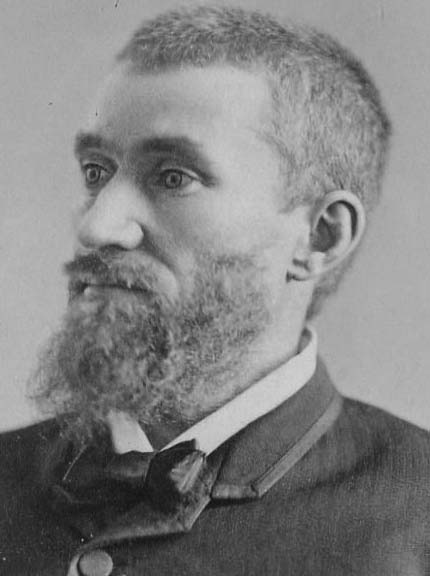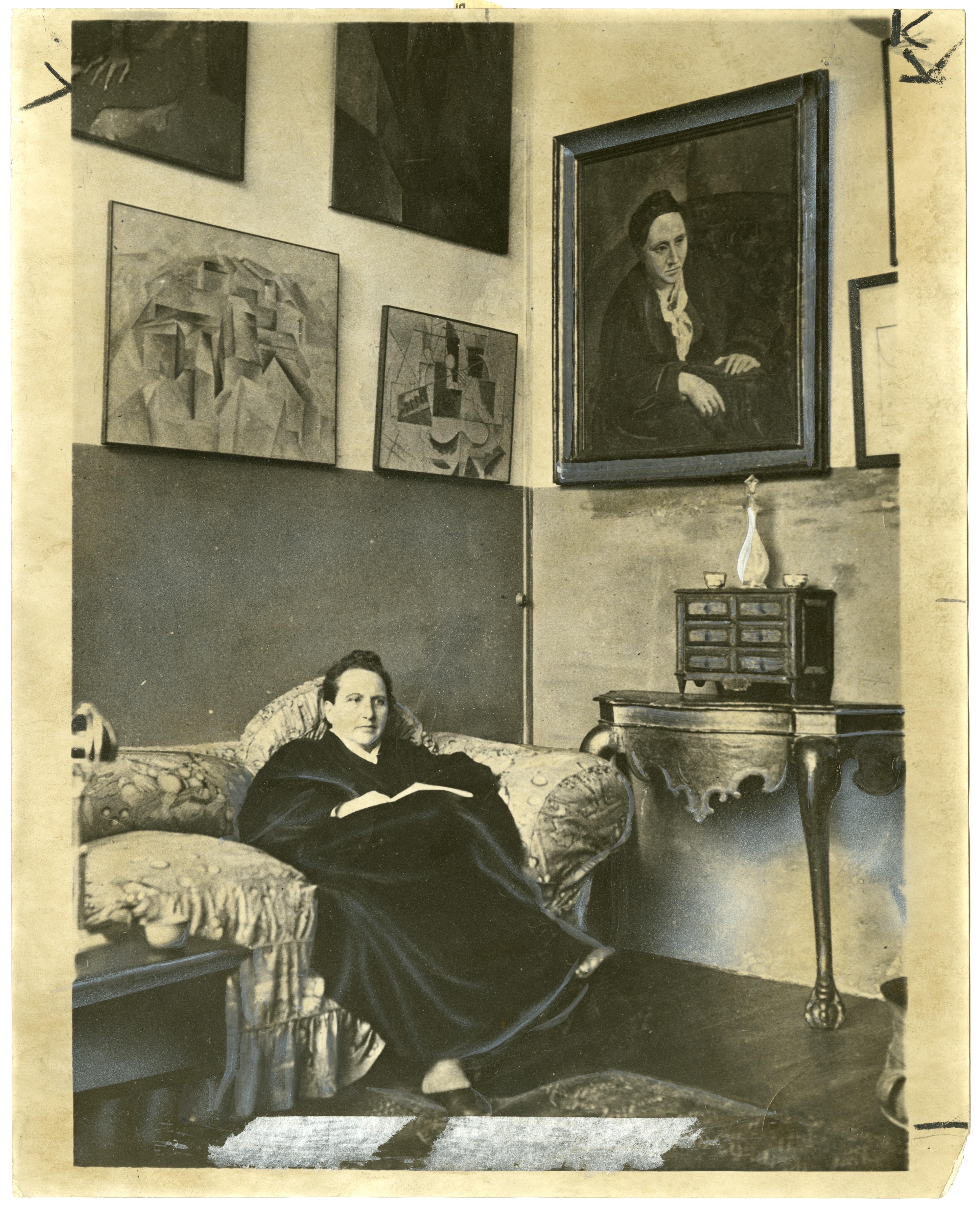February Theater Preview: Dark Side Rising, Sunny Days Ahead

Things are not looking good for ex-Nazi Arthur Rudolph (Jonathan Tindle, center) in City Theatre’s new production, although the play is called “Some Brighter Distance.”
Whether it’s the winter weather or the spirit of the times, Pittsburgh’s live theater schedule in February includes an unusual number of dark numbers. There are two shows dealing with Nazi Germany: the world premiere of Keith Reddin’s play Some Brighter Distance (at City Theatre), and a new touring production of one of the original dark musicals, Cabaret.
Speaking of dark musicals, they don’t get much darker than Stephen Sondheim’s Assassins (Split Stage Productions). Pitt’s Department of Theatre Arts is staging a classic from the archives of dark absurdist comedy, Ionesco’s Rhinoceros, while other university theaters present a couple of plays that are not for those easily disturbed. Carnegie Mellon’s Director Series has 4.48 Psychosis—written by playwright Sarah Kane before her suicide—and Point Park Conservatory is doing The Bluest Eye, adapted from Toni Morrison’s dark and controversial first novel.
Is Quantum Theatre’s Ciara a “dark” play? This complex one-woman show is said to be haunting but illuminating, so we shall put it in the tragicomic to semi-dark range. Also hard to categorize is Pittsburgh Opera’s Twenty-Seven: It’s about Gertude Stein and Alice B. Toklas, who defy easy classification.
And for fans who prefer to Always Look on the Bright Side, there’s a good bit of that on the schedule as well. The Broadway musical of The Full Monty (on Carnegie Mellon’s main stage) and Pittsburgh Public Theater’s Guys and Dolls provide happy endings with music and laughs along the way, as do some productions elsewhere.
Shows are previewed in order of run dates. This can get a little arbitrary, since a bunch of openings and closings overlap, so keep lookin’.
SOME BRIGHTER DISTANCE by Keith Reddin. Through Feb. 14, City Theatre.
At the end of World War II, a U.S. intelligence program called Operation Paperclip tracked down large numbers of German scientists and engineers. In the Nazi regime they had built the V-2 rockets launched against London and other Allied cities. These men were brought to the United States, where they led the design of new American rockets—first for the country’s nuclear arsenal, then for the Apollo space flights. A new play about this strange turn of events is making its world premiere at City Theatre. Some Brighter Distance is by Keith Reddin, a playwright known for dealing with moral ironies and paradoxes. Here he focuses on the story of engineer Arthur Rudolph, who became a fervid American citizen and a director of the Apollo projects, but later was forced to leave the country when controversy arose over his possible connection to Nazi-era war crimes. Rudolph’s famous colleague Wernher Von Braun is also a character in Some Brighter Distance. 1300 Bingham St., South Side.

In David Harrower’s play at Quantum, the past speaks to Ciara (Mary Rawson) and Ciara talks back.
CIARA by David Harrower. Jan. 27 – Feb. 14, Quantum Theatre.
Every so often in its forays into the unusual, Quantum Theatre presents a play that sets out to conduct a sweeping exploration of all aspects of the human condition, or at least a lot of them. Mnemonic (performed in 2013) was one such play and Ciara is another. But whereas Mnemonic took you on a whirlwind tour of the history and mysteries of Western civilization, with parallel plots unfolding across Europe while actors hopped between multiple roles, Ciara offers a different kind of journey. This new piece by Scottish playwright David Harrower is a one-person, one-location play. The title character is a middle-aged woman who owns an art gallery. Her late father was a mobster, head of a criminal enterprise now run by her husband. At the gallery, Ciara is exhibiting an artist who ignites her passion, in more ways than one. And as she reminisces and rambles, she reveals a life in which art, crime, love, drugs, violence, and high and low society all come together, or maybe apart. Ciara was a sensation at the Edinburgh Fringe festival in 2013. Quantum is giving the play its U.S. premiere with Mary Rawson as Ciara. At Javo Studios, 5137 Holmes St., Lawrenceville.
https://www.youtube.com/watch?v=PDSGtcgRjxA
GUYS AND DOLLS (musical) by Frank Loesser, Jo Swerling, and Abe Burrows. Jan. 28 – Feb. 28, Pittsburgh Public Theater.
Pittsburgh Public Theater’s musical this season is among the most storied—literally—of all time. Guys and Dolls was adapted from short stories by Damon Runyon, who wrote wildly popular tall tales about gamblers and grifters in the New York underworld of the 1920s and ‘30s. The 1950 musical delighted audiences and dominated the Tony Awards by translating Runyon’s colorful style to the stage. A 1955 movie version won no Oscars, but won a place in show-biz lore because of the actor cast in the lead: It was Marlon Brando’s only musical. (As the video above illustrates, he “acted” his songs more than actually singing them.) The plot of Guys and Dolls revolves around a gambler betting he can woo a beautiful woman who is out to save souls as a street-corner evangelist. Of the songs, only “Luck Be a Lady” became a stand-alone hit—but the songs weren’t written to stand alone. One reason Guys and Dolls has been called a “perfect” musical is that the music and story work so well together. At the O’Reilly Theater, 621 Penn Ave., Cultural District.

Charles Guiteau insisted he didn’t kill James Garfield; “the doctors did.” Guiteau, who was hanged anyway, reappears in Sondheim’s “Assassins.”
ASSASSINS (musical) by Stephen Sondheim and John Weidman. Jan. 29 – Feb. 6, Split Stage Productions.
Stephen Sondheim’s Assassins is similar to his earlier musical Sweeney Todd in this respect: Both are insidiously entertaining shows about gruesome subjects. The difference is that the murders and madness depicted in Assassins are real. The characters are nine people from history who killed, or tried to kill, American presidents. They’re brought together for an imaginary shooting-gallery game at a fair. Then, in bizarre scenes and songs that can make you laugh while you shudder, the nine take turns acting out their deranged passions and firing away. Booth and Oswald have major scenes, of course, though the meat of the show spotlights lesser-known figures like Charles Guiteau, the grandiosely deluded assassin of James Garfield, and Sara Jane Moore, the pistol-packing mom who shot at Gerald Ford and missed. Westmoreland County’s Split Stage Productions is performing Assassins, which itself has been one of Sondheim’s lesser-known works. The musical (with libretto by John Weidman) was written off as a striking but odd experiment when it premiered in 1990. But a 2004 Broadway revival won multiple Tony Awards, and Assassins has gained growing attention lately. At Greensburg Garden and Civic Center, 951 Old Salem Rd., Greensburg.
CABARET (musical) by John Kander, Fred Ebb, and Joe Masteroff. Feb. 2-7, Roundabout Theatre Company of New York at Benedum Center.
The ruling artistic style of our time is dystopian. So many cultural products are created in this key that they ought to carry warning labels, lest the masses suffer dystopian overdose. Yet some perennial classics stand out from all the look-alikes, one of them being Cabaret, of which a new touring production visits Pittsburgh. This Tony-winning Best Musical of 1966 is not set in any shadowy, unspecified future time and place. Cabaret is drawn from Christopher Isherwood’s novel Goodbye to Berlin, set in the actual dystopia of Germany during the early 1930s. The Depression had flattened people’s spirits, and while many sought an escapist lift in kinky night spots like the musical’s Kit Kat Klub, another kind of spirit—Hitler’s—crept over the scene. If you know Cabaret from the movie with Liza Minnelli (above) and Joel Grey, you’ll find the new road show dials up the kink even further. It is produced by the maestros at New York’s Roundabout Theatre Company, who did the revival that featured Alan Cumming as a deliciously wicked Emcee. Randy Harrison of TV’s “Queer as Folk” plays the Emcee here. Benedum Center, 237 7th Ave., Cultural District.
ALEXANDER AND THE TERRIBLE, HORRIBLE, NO GOOD, VERY BAD DAY (musical) by Shelly Markham and Judith Viorst, from the children’s book by Viorst. Feb. 5-14, Stage 62.
In the trade, children’s theater is called TYA (theater for young audiences), and normally Entertainment Central doesn’t cover it. We are making an exception for Alexander and the Terrible, Horrible, No Good, Very Bad Day. This musical is based on a children’s book that many current grownups enjoyed when they were little, and it is being put on by Stage 62, a company known for top-notch productions of adult musicals. So if you’re in the mood for some childhood throwback entertainment, here is a chance to see it done well. Alexander starts with our hero waking up to a bad hair day—last night’s chewing gum has gotten stuck in it—and things go amusingly downhill from there. The Stage 62 version is not the same as the recent movie that starred Steve Carell as Alexander’s dad. It is a full-fledged musical written by Judith Viorst, author of the original book, with Broadway composer Shelly Markham. In the Music Hall at the Andrew Carnegie Free Library, 300 Beechwood Ave., Carnegie.
SATURDAY NIGHT FEVER (musical) by Nan Knighton, Arlene Phillips, Paul Nicholas, and Robert Stigwood, adapted from the movie. Feb. 11-21, Pittsburgh Musical Theater.
The original, R-rated Saturday Night Fever is one hell of a movie, with an authentic street feel and explicitly rough scenes that transcend disco glitz and have helped to put the film on many lists of all-time favorites. However, those same qualities made the movie unsuitable as family entertainment—which led to PG versions with some scenes removed, and, later, a stage musical cleansed of nudity, profanity, and violence. Pittsburgh Musical Theater is performing this family-friendly Saturday Night Fever, a show that has turned out to be quite popular in its own right. You still get a grown-up cast singing and dancing to the Bee Gees’ soundtrack, and most of the story is preserved, in a version rated OK for just about anyone. Byham Theater, 101 6th St., Cultural District.
PETER PAN (ballet) by Jorden Morris. Feb. 12-21, Pittsburgh Ballet Theatre.
Speaking of childhood throwback entertainment: Who doesn’t like Peter Pan? Well, Captain Hook doesn’t, but he has graciously agreed to dance with Peter, Wendy, and the gang in Pittsburgh Ballet Theatre’s production of the classic J.M. Barrie story. Barrie’s stage play Peter Pan opened in London in 1904. Later on, for reasons that perhaps social psychologists could explain, the tale of the boy who wouldn’t grow up became immensely popular in America during the 1950s, as Walt Disney’s animated movie and a Broadway musical both scored big. Canadian choreographer Jorden Morris created the ballet in 2006. He has removed the ethnic stereotyping that plagued the Disney film (and Barrie’s original). And, since the basic Peter Pan story has plenty of physical action, it proves to be highly danceable. The ballet includes aerial acrobatics, because remember: This kid can fly. Benedum Center, 237 7th St., Cultural District.
4.48 PSYCHOSIS by Sarah Kane. Feb. 17-19, Carnegie Mellon School of Drama.
Some of the most intriguing theater in town can be found in Carnegie Mellon’s Director Series. Admission to the student-directed plays is free—you can contact the School of Drama’s box office for tickets on performance days—and the Series presents unusual plays rarely done by big companies. Sarah Kane’s 4.48 Psychosis is not for viewers with delicate sensitivities. Kane, a brilliant but troubled English playwright, committed suicide in 1999 at the age of 28. She finished writing 4.48 Psychosis shortly before that. The play is lucid but non-linear; it has been called brutal but eloquent, and whether it conveys an “understanding” of depressive psychosis is a moot question—it certainly conveys the essence of one woman’s struggles. Kane was considered a leading artist of the British movement known as In-Yer-Face theatre, and this play fits the category. In the John Wells Video Studio at Carnegie Mellon’s Purnell Center for the Arts, 5000 Forbes Ave., Oakland.
THE FULL MONTY (musical) by Terrence McNally and David Yazbek, adapted from the movie. Feb. 18-27, Carnegie Mellon School of Drama.
When unemployed steelworkers earn money by dancing naked for a crowd of screaming women, is it entrepreneurship or is it comedy? Maybe both. The makers of The Full Monty turned a low-budget movie into a huge hit with a plot built on that premise. Shortly after the 1997 British film came a Broadway musical, which Carnegie Mellon’s School of Drama is performing on its main stage. As in the movie, most of the story lies in the build-up to the striptease act, following a group of desperate men as they seize upon the idea, then wrangle over whether to take their privacy fully public. The musical Americanizes The Full Monty, moving the action from Sheffield, England to Buffalo. And whereas the movie score relied on existing pop tunes, the musical features original numbers like “Let It Go” (above). At the Philip Chosky Theater in Carnegie Mellon’s Purnell Center for the Arts, 5000 Forbes Ave., Oakland.
RHINOCEROS by Eugène Ionesco. Feb. 18-28, University of Pittsburgh Theatre Arts.
Eugène Ionesco (1909-1994) was labeled an absurdist playwright. One can imagine Ionesco responding, “You want absurd? Try real life.” Pitt’s Department of Theatre Arts is staging his Rhinoceros, in which the perfectly civilized inhabitants of a small town mutate one by one into snorting, stampeding rhinoceroses. If you had read the play in school, you were taught that it’s an allegory about conformity, reflecting the 20th-century events that turned masses of people into Nazis, Fascists, or fierce partisans of other ideologies. The interpretation rings true, but seeing Rhinoceros performed live is an experience that goes beyond finding a meaning in the text. It brings out the play’s sly ironies and raucous physical comedy. It personalizes the story, if that’s the right word for a play about persons being rhinoceros-ized. And it’s always fun to see how the cast and crew will portray the rhinoceros-izing—there is a scene that calls for one character to transform in full view on stage. Studio Theatre, B-72 Cathedral of Learning, 4200 Fifth Ave., Oakland.

Gertrude Stein at home under her portrait by Picasso, who is a character in “Twenty-Seven.”
TWENTY-SEVEN (opera) by Ricky Ian Gordon and Royce Vavrek. Feb. 20-28, Pittsburgh Opera.
Two prominent artistic figures lived briefly in Pittsburgh before their trajectories crossed many years later. Gertrude Stein was born in Allegheny (now the North Side) in 1874, then moved away with her family at age 3, eventually settling in Paris where she became an avant-garde writer and a famous friend to famous artists. Long Island native Ricky Ian Gordon studied at Carnegie Mellon in the 1970s on his way to becoming a composer, known for musical works adapted from American literature. Gordon has written operas including The Grapes of Wrath, from Steinbeck’s novel, and art songs like the quirky “Lana Turner Has Collapsed,” from a Frank O’Hara poem. Was it inevitable that he would compose a Gertrude Stein opera? Twenty-Seven, titled after Stein’s Paris address at 27 Rue de Fleurus, is being staged by Pittsburgh Opera after its recent premiere in St. Louis. The opera presents scenes from her storied life—especially her long relationship with Alice B. Toklas—and has been praised for combining Stein-ish humor with lively music. The libretto is by Royce Vavrek. Pittsburgh Opera’s Twenty-Seven has mezzo-soprano Laurel Semerdjian as Stein and soprano Adelaide Boedecker as Toklas. At the company’s headquarters, 2425 Liberty Ave., Strip District.
THE BLUEST EYE by Lydia R. Diamond, adapted from the Toni Morrison novel. Feb. 25-28 & Mar. 10-13, Point Park Conservatory Theatre Company.
Toni Morrison’s first novel—the one that set her on the path to a Nobel Prize for Literature—also ranks high on banned book lists. There have been frequent attempts to keep The Bluest Eye out of schools and libraries nationwide. It won’t be kept off the stage in Pittsburgh, as Point Park Conservatory Theatre performs playwright Lydia R. Diamond’s adaptation of the controversial story. The Bluest Eye is about a preteen African American girl who dreams of becoming white, thinking she’d then be prettier. Instead she becomes pregnant after being raped by her estranged father. Many twists and turns follow, played out both in surreal visions and on the level of harsh reality. Diamond’s The Bluest Eye was commissioned by Chicago’s Steppenwolf Theatre, which premiered it in 2005 for audiences teenaged and up. The play is reputedly not as brutal as the novel but not for small children, either. In the Rauh Theatre at Pittsburgh Playhouse, 222 Craft Ave., Oakland. Pay-what-you-want preview performance on Feb. 25 at 8 p.m.
LOUISE LECAVALIER and FOU GLORIEUX in SO BLUE (modern dance). Feb. 26 at 8 p.m. only, presented by Pittsburgh Dance Council.
Pittsburgh Dance Council brings to town the kinds of artists who are virtually unknown to everyone except avid modern-dance fans—and who are nonetheless capable of blowing audiences away, to the point where people leave feeling they’ve “discovered” an exciting new talent. Next up is Louise Lecavalier and her dance troupe Fou Glorieux. (Which Google Translate renders as “crazy glorious,” though “glorious fool” also would do.) Montreal-based Lecavalier isn’t exactly unknown. In addition to creating her own works, she has choreographed and danced with David Bowie and others. Her dancing is energetic and sensuous. In Pittsburgh, Lecavalier and Fou Gloriuex will perform one of their signature feature-length pieces, So Blue. At the Byham Theater, 101 6th St., Cultural District.
Photo credits: Some Brighter Distance, by Kristi Jan Hoover. Ciara, by Heather Mull. Charles Guiteau, unknown, ca. 1882 (public domain). Gertrude Stein, Wide World Photos, 1930; Library of Congress.
Mike Vargo, a Pittsburgh-based writer and editor, covers theater for Entertainment Central.
Share on Social Media
Follow Entertainment Central
Latest Stories
Sign up for the EC Newsletter







